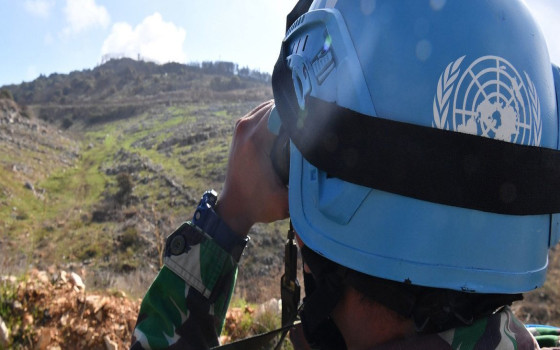
Call to Modernize UN Peacekeeping Operations to Meet Future Challenges

- Europe and Arabs
- Wednesday , 14 May 2025 10:27 AM GMT
New York - Berlin: Europe and the Arabs
UN Secretary-General António Guterres called for strengthening peacekeeping operations to be more relevant to contemporary and future challenges, stressing that peacekeeping remains a central tool for achieving peace. He praised the sacrifices and contributions of peacekeepers in conflict zones around the world, according to the UN Daily News Bulletin, a copy of which we received Wednesday morning.
The Secretary-General was speaking at the Ministerial Meeting on the Future of Peacekeeping, hosted by Germany on Tuesday and Wednesday. He emphasized that "the United Nations was founded on the belief that peace is possible if we work as one united human family."
The Secretary-General said that UN peacekeepers—or Blue Helmets—symbolize global solidarity, helping to maintain ceasefires, protect civilians, facilitate humanitarian assistance, and support long-term recovery in conflict zones.
The Secretary-General cited a number of countries that have achieved lasting peace with the support of UN peacekeeping forces—including Cambodia, Côte d'Ivoire, El Salvador, Liberia, Namibia, Mozambique, Sierra Leone, and Timor-Leste. He noted that many of these countries currently contribute troops to peacekeeping operations. However, peacekeeping comes at a cost, according to the Secretary-General. More than 4,400 peacekeepers have been killed in the line of duty.
Guterres acknowledged the growing challenges facing peacekeeping today: more complex and cross-border conflicts, global polarization, misinformation targeting missions, terrorism, climate-related instability, and widespread disregard for international law.
With a record number of conflicts and displaced persons, peacekeeping is under greater pressure than ever, according to the Secretary-General.
Serious Financial Problems
Unfortunately, the Secretary-General says that UN peacekeeping operations continue to face serious cash flow problems.
He warned that peacekeeping—although its budget represents less than 0.5 percent of global military spending—is one of the most cost-effective tools for building international peace and security. He called on all 193 Member States to fulfill their financial commitments and help build future-ready peacekeeping missions that meet current and emerging global challenges.
Three Areas for Action
The Secretary-General identified three key areas he emphasized for future focus:
First, building peacekeeping operations fit for the future, noting that the upcoming review of peacekeeping operations—as outlined in the Charter for the Future—will assess how to make peacekeeping more adaptable, flexible, and better suited to specific contexts, especially where peace is fragile or absent.
The Secretary-General noted that success stories such as UNIFIL in Lebanon and MINUSCA in the Central African Republic demonstrate the value of adaptability.
He also emphasized the importance of partnerships, particularly with the African Union. He explained that Security Council Resolution 2719 has strengthened the partnership between the two sides to a new level "as we work to establish peacekeeping implementation missions under the responsibility of the African Union, with the support of the United Nations."
Second, improving the use of resources. In this context, Guterres urged the establishment of more flexible financial and logistical rules to maximize limited resources. He called for more realistic mandates, streamlined operations, and stronger coordination with troop-contributing countries to ensure that operations are feasible and effective, despite financial constraints.
He continued, "Our review of peace operations will work alongside the UN 80 initiative to ensure maximum efficiency wherever possible, with support from Member States at every step."
Third, there is a need for political support. In this regard, he emphasized that no peacekeeping mission can succeed in the absence of political solutions. He called on Member States to support missions with political unity, leadership, trained personnel, and equipment, and to respect UN mandates and immunities.
He stated that such support—including financial contributions and strategic pledges—is vital.












No Comments Found